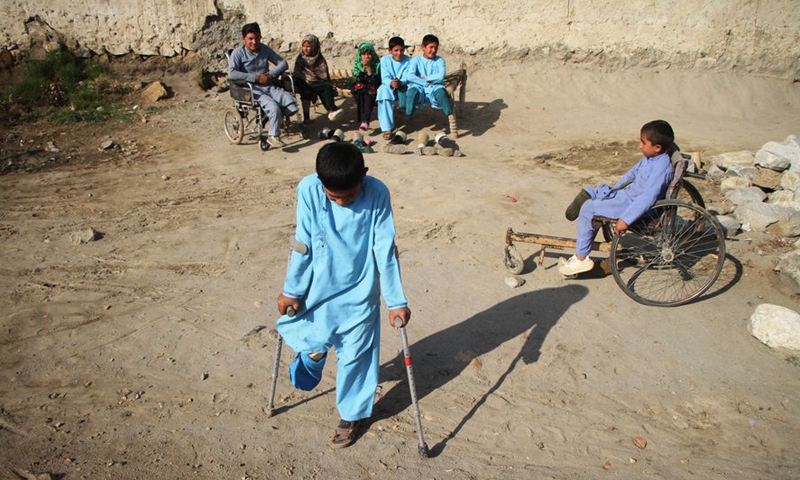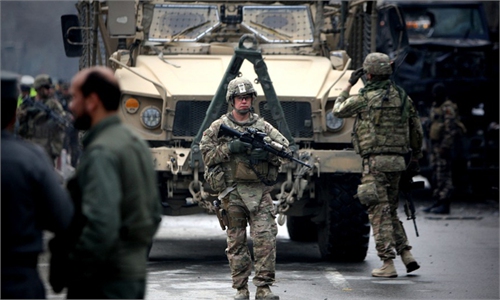
Photo taken on Feb. 22, 2020 shows disabled children in Surkh Rod district of Nangarhar province, eastern Afghanistan. The UN Assistance Mission in Afghanistan (UNAMA) has documented more than 10,000 civilian casualties in 2019, of these more than 3,400 had been killed, said a report of the body released. (Photo by Saifurahman Safi/Xinhua)
On Wednesday, US President Joe Biden said that he plans to withdraw remaining US troops from the "forever war" in Afghanistan before September 11. He declared that the September 11 attacks of 20 years ago cannot justify American forces still dying in the nation's longest war.Looking back at the reason why the Afghanistan War started, the US waged this war to primarily protect its self-interests.
First of all, the US wanted to retaliate against Al Qaeda for the 9/11 attacks in New York. Then it wanted to root out terrorism from its breeding grounds. Of course, there were even more selfish considerations from Washington: Its real intention was to use the counterterrorism war to overthrow the governments of countries such as Iraq and Afghanistan and Westernize the entire region eventually.
Washington considers only for itself. In US' assessment of the situation in Kabul, Afghanistan, terrorism is at least within the control of the local government; and it is unlikely to cause large-scale unrest. So even if terrorism has not been eliminated completely yet, there is no direct threat to the US mainland so far. Thus, the US doesn't want to be a major anti-terrorism force in the region anymore.
If US troops withdraw from Afghanistan as Biden plans, there is a risk that the world needs to be worried about. It is still uncertain if US counterterrorism actions in Afghanistan are effective enough to root out local terrorism. If not, the extremist forces are more likely to grow and spread out again and when the current Afghan government is not capable enough to control the situation.
To eradicate its religious extremism, what Kabul really needs to do is improve the level of education and the livelihood. It also needs to increase employment so that those who engage in violent acts can have a stable career, which is probably the best way to solve the problem. But this process is too time-consuming and requires too much investment as well. As Afghanistan itself may not have the ability to do this, major developed countries in the world should offer assistance.
But the help Washington can offer is limited because it doesn't have enough money. According to the US Department of Defense, the total military expenditure in Afghanistan reached $778 billion in September 2019. Washington may be less willing to invest in Afghanistan in the future. Afghanistan is not a neighbor of the US, therefore the US may think there is no need to take care of Kabul. What the US government is really concerned with is preventing the reemergence of destructive terrorist activities that can spill over from the region. As long as this can be guaranteed, the US government will pay less attention to the Afghanistan issue. In general, I think the US will reduce its input in Afghanistan in the future. The main purpose for Biden to withdraw troops from the country is to relieve Washington from unnecessary burdens abroad.
It's likely that the US will shift its military and security focus to the Indo-Pacific region in the future. The troops pulling out from Afghanistan may be dispatched to US military bases in Southeast Asia, Guam and Hawaii. Or return to the US. But the priority of the US will be to strengthen and optimize the military deployment around China. Washington will focus on dealing with China and Russia in the future. So the US will shift attention away from its perceived insignificant matters, concentrating on confronting China and Russia.
The biggest mistake that the US has made during the past 20 years of war on terror is that it got its strategic focus wrong. There is nothing wrong with anti-terrorism, but the US expanded the war on terror in an attempt to achieve some unrelated goals. This consumed a lot of its resources, and inflicted pains on other countries. If the US didn't wage the war on terror, or if it really only targeted terrorism, it would haven't devoted so much resources or wasted energy.
The author is a research fellow at the Institute of American Studies at the Chinese Academy of Social Sciences. opinion@globaltimes.com.cn



